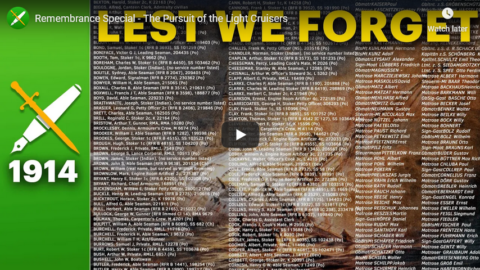Historigraph
Published 15 Nov 2020Released on Volkstrauertag and to mark all of the various Remembrance Days around the world, this is the story of the pursuit of the light cruisers and a tribute to those who lost their lives.
Get the full story of the Battle of the Falkland Islands here: https://youtu.be/cBCCnqiVOUk
This video is unmonetised for me due to the music I included at the end (any ads you see are for copyright holders). If you wanted to support me to make more videos without relying on ads or sponsorship, I’d appreciate it if you checked out my Patreon https://www.patreon.com/historigraph
Buy Historigraph Posters here! teespring.com/stores/historigraph
#BattleOfTheFalklandIslands #Historigraph #CuriosityStream
► Twitch: https://www.twitch.tv/addaway
► Twitter: https://twitter.com/historigraph
► Instagram: https://www.instagram.com/historigraph
November 16, 2020
Remembrance Special – The Pursuit of the Light Cruisers
US M1915 Bolo Bayonet – Dual Purpose Gear That Worked!
Forgotten Weapons
Published 27 Nov 2017The M1915 bolo bayonet was originally the brainchild of US Army Captain Hugh D. Wise, Quartermaster with the 9th Infantry in the Philippines. In 1902, he recommended the implement in a letter to his superior officers, noting that a bolo style of bayonet (ie, one with a widened machete-like blade) would have several advantages over the standard knife bayonet then being issued with the Krag-Jorgenson rifles the US Army was using. Specifically, the wider bayonet would be easier to recover after a thrust (he noted several instances of troopers being killed while trying to extricate their bayonets from enemies) and also (and more significantly) make an excellent and necessary bushwhacking tool in the jungle environment of the Philippines.
Wise’s idea was taken with interest and Springfield produced a series of experimental bolo bayonets, but the project ended there as the 1903 Springfield was adopted with a rod bayonet instead of a blade. Of course, the rod bayonet would be shortlived, and the blade bayonet would come back. The bolo bayonet ideas resurfaced in 1911 when a commission was formed to look into special equipment for the Philippine Scouts. After another series of experimental designs, the M1915 Bolo bayonet was formally adopted on May 22, 1915 and an order was placed for 6,000 of them to be made at Springfield Armory.
Delivery of these bayonets took place in 1915 and 1916, and they proved to be extremely popular tools with the soldiers in the Philippines. They would remain in service on the islands until World War Two, serving at last as a replacement for the M1913 cavalry saber for the 26th Cavalry.
http://www.patreon.com/ForgottenWeapons
Cool Forgotten Weapons merch! http://shop.bbtv.com/collections/forg…
If you enjoy Forgotten Weapons, check out its sister channel, InRangeTV! http://www.youtube.com/InRangeTVShow
QotD: India’s civil service
The process was started in October last year. Here we are at the end of August 10 months later. And we’ve still managed to get no closer at all to hiring any accountants.
Now, one good thing about the Indian civil service is that it carries on the old British practice of entry being by competitive examination. This at least loosens the possibility of influence and bribery determining who gets hired. But now think of the incompetence with which the process is being carried out. We’ve at least 7 months here just to mark the exam papers!
And that is really what ails India. The snail’s pace of the bureaucracy. It would actually be far better if the place had near no government rather than the one it has. Anarchy is indeed preferable to a system which allows near nothing to happen officially. Because what happens when a bureaucracy is so slow that it strangles the ability to do anything legally is that it is all done in illegal anarchy anyway. Some 85% of the Indian economy is over in the unregistered, untaxed and informal sector. Precisely and exactly because the official sector is run by that bureaucracy that cannot even hire the occasional accountant. A bonfire of the babus would improve the place immeasurably.
Tim Worstall, “What’s Wrong In India – All 8,000 Fail Goa’s Exam To Be Government Accountants”, Continental Telegraph, 2018-08-23.





